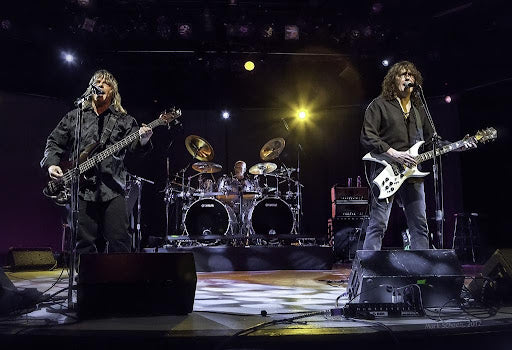Randy Jackson

RANDY JACKSON OF ZEBRA
Rock N’ Roll for Life
AUTHOR/EDITOR: JENNIFER J. LACELLE
DECEMBER 27, 2021
The quaking resonation against the walls of rock and roll eventually paired with the lively humdrum of the New Orleans music scene can create intriguing musical influences. Randy Jackson of the rock band Zebra, grew up listening to not only these styles but further stacked with the sounds coming from the British airwaves, most notably the Beatles.
Music’s in the Air
Jackson notes that people tend to draw on their influences “for where you’re gonna go.” Of course, everyone is influenced by someone (it’s hard not to be, especially when young), and Jackson recalls mostly listening to Moody Blues, Led Zeppelin, and the Beatles.
He began learning music in his early childhood, beginning with piano at around six years old. He moved on to the baritone horn, which he played all the way from elementary school through college. At 15, he started learning guitar but that was in-between his regularly scheduled sports, and says it would be hiding under his bed for half the year.
“If I wake up in the middle of the night and I remember the song, I gotta be able to play it through.” Jackson also preferred the guitar over other instruments, so as he became more invested in music it became his main choice.
Shortly after completing high school, Jackson obtained work at a local bar part-time while prepping to attend college. Initially, he was studying physics as his major while minoring in music. These may seem like polar opposites, but he says they’re quite similar in that both require “imagination.”
“Physics is pretty creative. Anybody doing research… they have to change what they learn to fit what they’re seeing.”
He quit school about a year into playing with Zebra to pursue music because a teacher encouraged him to follow his passions, and reminded Jackson he could always return to his studies at a later point.
STRIKING AN A-CHORD
While working at the bar, Jackson met a guy who was working at a clothing store next door. Turns out that person would be Felix Hanemann, Zebra’s main keyboard player, but first he was playing in a band called Shepherd’s Bush with another fellow.
They were seeking a guitarist for the group and Jackson fit the bill.
At that point, the three played together and performed all original songs that Hanemann had created. During this period, Jackson met Guy Gelso through a mutual friend. Gelso had moved to New Orleans from Sacramento, California in 1973.
After about a year of the initial trio playing in Shepherd’s Bush, the bland split up but Gelso and Jackson were already jamming together.
It was shortly after that period the trio was regularly getting gigs and came up with the name Zebra. While Shepherd’s Bush had performed all original songs, Zebra quickly became a cover band because they wanted the gigs to make a little cash and recognizable songs would always be a hit.
However, the group would always throw in a few original tracks but not mention it to the crowd. Instead, people would approach them and ask who the artists were to these unknown songs.
It was a way of keeping track of which songs people truly enjoyed rather than announcing and receiving an, “oh, it was great,” as a means of placating them. So, when people truly didn’t know and made positive commentary they would know it was working.
This became especially important with their move to New York since they were requested to play only covers. Jackson believes the fear from clubs would be that having unknown music, and an unknown band, in their establishments could scare away their customers. “Once people started recognizing the songs [you can] play whatever you want,” says Jackson.
Of the transition to the Big Apple, he mentions that Long Island was essentially the same as New Orleans, but Manhattan had a “different atmosphere.” Although, the biggest shock was the snow.
“We found out was snow was,” he laughs.
“We came to New York during one of the coldest winters and it was brutal with the snow. We thought it was a normal thing, but it was cold!”
Hitting the Magic Number
By 1978, they had attempted to sign a record deal but the feedback seemed to be on a continuous loop as they heard, “dated,” every time.
Their sound wasn’t as current, or futuristic, as the record companies wanted. However, there was one particular radio station that enjoyed Zebra’s sound.
Bob Buckman of WBAB began playing their demo tracks and they quickly became some of the station’s most-requested songs.
Subsequently, their first album came out in 1983 and sold over 75,000 copies in one week! It was the fastest selling debut album in Atlantic Record’s history. However, those numbers didn’t convince the company to begin promoting them.
“I was scratching my head but the record company wasn’t promoting it… like what are you doing?” What did convince the company was a mere seven albums sold in St. Louis, Missouri. So, it wasn’t until a few months after the release that the company began putting their money into Zebra and sent them off to tour.
The album ended up being on the Billboard charts for eight months, which is very unheard of, and Jackson thinks it’s because the band had a slow build up across the country. He further thinks it was a word-of-mouth scenario, and says that’s the best type of promotion people can obtain and a very good compliment.
It’s been 46 years since Zebra was established and the trio is still working and performing together (an unlikely feat for any group of people). Jackson says it’s pretty amazing and there’s a good line-up of performances coming for 2022 (masks and all).
“Statistically, you’d think one of us is dead by now,” he chuckles. “We’re playing as long as we can.”
